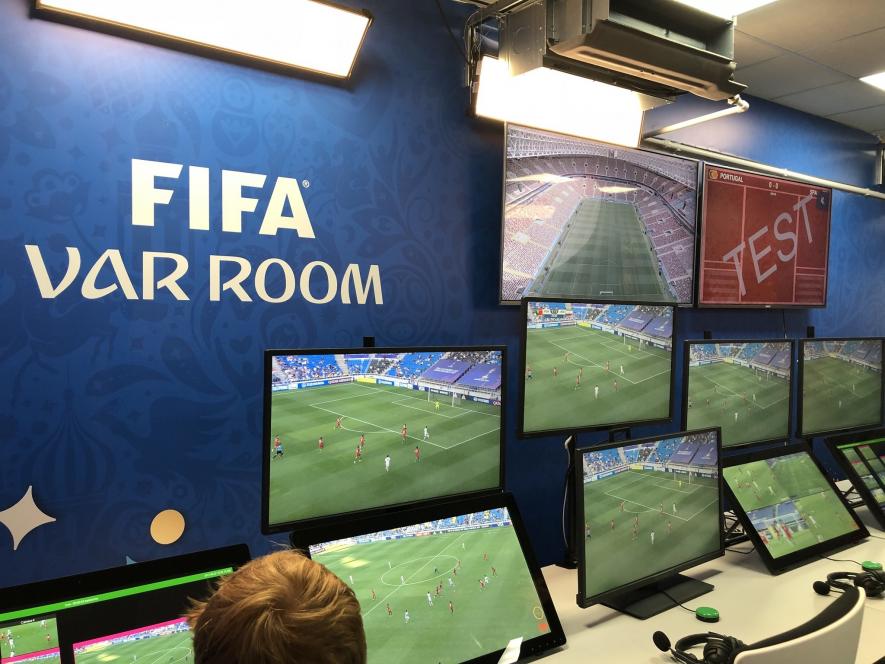FIFA World Cup 2018: The VAR is on in Russia

A total of 13 officials will be dedicated exclusively for the VAR system during the FIFA World Cup, while six other referees would pitch in when they are not officiating games on the field.
The FIFA World Cup, every edition without fail, heralds the birth of a few footballing stars, and sees the anointing of some superstars as demigods, while the fans are left drenched in magical moments that end up defining their relationship with the game. However, there is a good chance that a few, if not all, defining moments of the 2018 edition in Russia would be decided in two rooms at a facility just outside Moscow which houses the Video Assistant Referee (VAR) centre.
The World Cup’s VAR operations centre was opened on Saturday, with FIFA stressing that the debutant system will not take control away from the referees on the field.
It better not, especially since the technology—used in various global competitions in the last two years—is still evolving.
A lot hard work and preparation goes into training and developing a VAR for FIFA #WorldCup, as Mark Geiger explains ️ ️
More information https://t.co/gb5YPlQu9g#FootballTechnology pic.twitter.com/lPCfaPT38Y
— FIFA World Cup (@FIFAWorldCup) June 9, 2018
The slightly less-than-perfect record of VAR gives us reasons to feel FIFA has jumped onto the tech bandwagon a tad early. The answer will be apparent in a month’s time, and the world has its fingers crossed, hoping the new system doesn’t end up altering the natural course of history on the pitch... or, put more bluntly, manufacture controversies of its own.
The system in Russia
FIFA, on its part, is trying to keep things as close to fool-proof as possible with dedicated manpower and tech in place for the course of the tournament.
A total of 13 officials will be dedicated exclusively for the VAR system, while six other referees would pitch in when they are not officiating games on the field, informed Massimo Busacca, head of FIFA Refereeing, during the opening of the VAR centre.
READ MORE | Heleno de Freitas, the Greatest Brazilian to Not Play FIFA World Cup
Each match will be monitored by a four-person group of assistant referees at the VAR centre, located in the International Broadcast Centre (IBC) just outside Moscow, which was inaugurated by FIFA President Gianni Infantino on Saturday. To avoid fatigue, each team will be in-charge of only one game a day.
In the team of four, one official will analyse controversial plays, one will follow the match live while the third will be responsible for offside calls and the fourth will act as back-up.
On the tech side, 33 cameras -- 35 starting from the round of 16 matches -- will power the VAR teams to monitor the action. The footage will arrive via a fibre-optic network, while a satellite system acting as a backup.
WORLD STANDS DIVIDED
The World Cup kicks off on June 14 with the opening match between hosts Russia and Saudi Arabia.
But much before the first kick of the ball, the VAR has begun a war between the old world and the new, and if it throws up a few controversies, FIFA’s eagerness to implement the system, which does have its pros, might lead to its downfall.
The footballing world is already divided about the effectiveness of VAR.
The great divide’s looming presence was best illustrated by Arjun Pandit, who has different views on the technology, one as a broadcaster, the other as a fan.
Pandit, who works as a presenter on Football United, Star Sports’ daily show during the World Cup, feels the VAR is great for TV.
“I think it would be a great addition to the pre/mid/post-match shows, a great way to dissect a decision on the field,” says Pandit. “It definitely leads to major talking points, as we’ve seen with VAR when it was implemented in its early stages. I Don’t think any broadcaster would complain, given that it adds another dimension to analysis of a football game.”
A tool for gamesmanship?
The naysayers—the purists—fear the influx of technology might kill the natural flow of the game on the pitch.
Former India footballer Renedy Singh talks about how stoppages for reviews might kill the whole essence of football.
“Football is a fast-flowing game and if VAR brings with it stoppages for reviews, that would kill the momentum and flow in the game, and the fun,” says the former midfielder, who recalled the disallowed goal of England’s Frank Lampard during the match against Germany at the 2010 World Cup, while explaining that though VAR has its merits and could have made a difference in that instance, he still feels it would have a negative impact on the charm of the game.
Renedy adds that in time, the teams might learn to and use VAR as part of their strategy to kill the momentum of the game, especially if it is slipping away from them.
“As footballers, we are ready to do anything on the pitch to win (remember the Luis Suarez deliberate handball at the 2010 World Cup in South Africa) and there is a chance that such methods would be employed to control or manipulate momentum during a match,” adds Renedy, hinting that VAR could add to gamesmanship in football.
That would be like a new form of diving!
Pandit, the fan, also feels the tempo of the game might get affected with the VAR.
“I, personally (as a fan) am not in favour of it as I feel it cuts down the tempo of the game that I fell in love with ages back, eons of years to be precise, as we guys are old now,” he says. “Having said that, the new generation that grows up with VAR will get accustomed to it as they will start watching the game with this aspect. If it cuts down errors then I’m all for it.”
Then, there are those among us who crave those cheeky moments of drama, which the fans then go on to revere as divine interventions.
READ MORE | Argentina’s Pull-out from FIFA World Cup Warm-up Dents Israel’s Arrogance
They would never want a potential hand-of-God moment in Russia be denied by an eye in the sky, would they? Imagine if such a system were in place in 1986—it would have killed a legend at birth, although the Brits would probably have been happier for it.
The jokes about and digs at the English team aside, VAR promises objectivity into refereeing, eventually ensuring fair play. And, to be fair to the technology, made possible by a network of cameras placed in and around the stadium, it does do a fair job.
Pandit highlights that and feels once the technology evolves it can only help football.
“Just the process I feel needs to be better, and these are early days so you will see chinks in the armour,” he adds. “I think with time everyone will embrace it and will hopefully cut the constant bullshit players give officials in their ears, which is unforgivable in my books.”
Indian women’s football team goalkeeper Aditi Chauhan concurs with Pandit and adds the introduction of VAR is a very practical decision.
“I welcome this change,” says Chauhan. “Many other sports have introduced changes to give themselves a modern outlook as well as make it more spectator friendly. On that front this is an ideal move. And, as a player, I welcome this as I feel VAR would make things fair for all, the players on both sides as well as the referees who are always under pressure as they make split-second decisions and are the first to face criticism if something goes wrong.”
VAR and red cards
The VAR has failed quite a few times in the last few years, the flops getting highlighted as it ended up drastically altering the fortunes of the match in question.
Last year, the KU Leuven university in Belgium conducted a study of 1,000 competitive matches that used VAR, and the numbers show that it serves the broad purpose of making things fair.
READ MORE | Sunil Chhetri’s Appeal Is Much More Than a Mere Call for Fan Support
The study concluded that the VAR improves decision accuracy from 93% to 98.8%. And, 9% of matches ended up with a different, possibly fairer, result.
The numbers from the study provide a telling picture, but the viral, game-altering failures in competitions such as the A-League, Bundesliga and the FA Cup have provided high-profile fuel for the skeptics as well.
The failures have a lot to do with how the VAR works as it attempts to make decisions more accurate, with more consistency, and at important points in a match.
There were a few issues with the network of cameras in the stadium failing to provide the referees with a clear picture. There were also instances when one or more crucial cameras were blocked by banners or people when an “incident” transpired. Such factors will always be there in the cacophony inside a football stadium.
Then comes the human element.
In Russia, the on-pitch referee will continue making the calls unaided at the same pace with which he would have worked earlier. Just that the VAR (the control centre has two rooms equipped with numerous TV screens, with four assistant referees monitoring each game) will check decisions on four type of incidents: Goals, including ‘missed’ attacking offences in the build-up, penalties (awarded/not awarded), direct red cards, and cases where the wrong player was shown a red or yellow card.
READ MORE | Odd Misses at FIFA World Cup: Alfredo Di Stéfano, the Slips Between the Cup and His Lip
The information from the VAR team would reach the referee via his earpiece, an option usually used for offside calls.
For red cards and penalty-box fouls, the referee also has the option to review the footage pitchside, from a monitor.
That’s where it gets a little subjective.
The Belgian university study brought out an interesting corollary—the referees are more likely to award a red card after watching the replay of an incident.
The factors are many, including the heat of the moment. And then, we all know how slow motion replays make things look more vicious than it actually is.
Now, that’s hardly being objective.
Get the latest reports & analysis with people's perspective on Protests, movements & deep analytical videos, discussions of the current affairs in your Telegram app. Subscribe to NewsClick's Telegram channel & get Real-Time updates on stories, as they get published on our website.
























